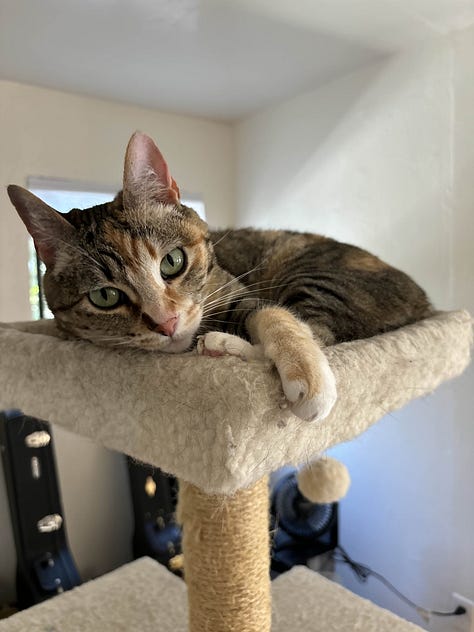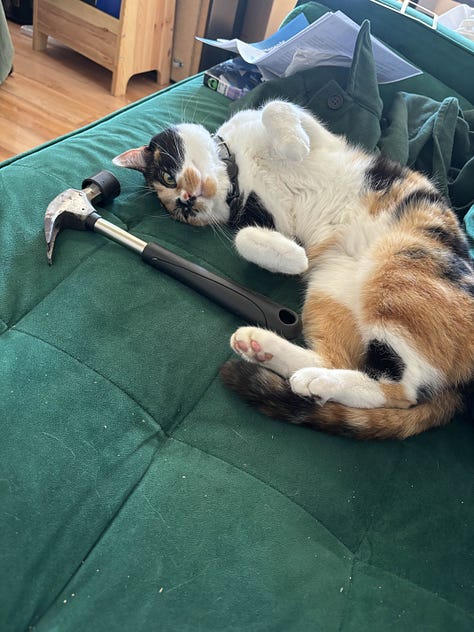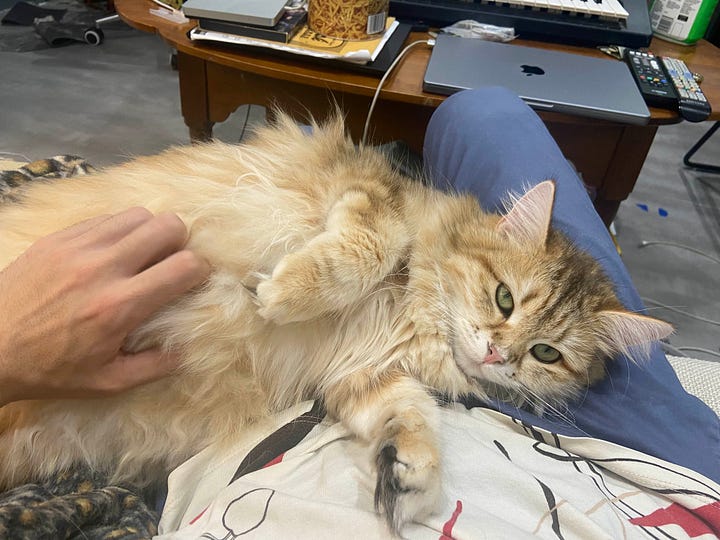Reboot Macrodoses are an informal ~weekly dump of what our editorial board is reading, watching, playing, seeing online, thinking about, or otherwise experiencing. It includes mini-essays, links, pictures, plus perspectives from our beautiful brilliant readers—if you’d like to publish a 250-word Letter to the Editor about our previous essays, you can now do so here.
In today’s issue of macrodoses, we have:
The Moo Deng moment
A response to Karen Hao’s new AI and climate piece
Why 2024 is becoming the animal election
Reboot personals
Cat photos
The Moo Deng Moment
By Jacob Kuppermann
In what can only be described as the finest moment in Thai cultural diplomacy this century, baby pygmy hippo หมูเด้ง/Moo Deng (literally, “Bouncy Pork”) has become an online sensation, proclaimed as icon/legend/the moment by Time Magazine and inexplicably moist/slightly blurry by Twitter user @mrmatthouse.
It’s easy to simply classify Moo Deng as just one extremely cute viral animal in a decades-long history of extremely cute viral animals—a global south take on the American hegemony represented by Fiona most directly—but there are a number of fun nuances in Moo Deng’s rise to prominence as one of the two individual living organisms born in 2024 to have a wikipedia page (the other is a Saudi princess. Less notable, imo!)
Key among them is that some incalculable percentage of the viral images of Moo Deng are in fact *not Moo Deng*—they’re Moo Toon and Moo Wan, her older, also pork-themed, siblings. The triple-Moo online operation, headed by Khao Kheow Open Zoo zookeeper Atthapon Nundee, appears to be a fairly intentional attempt towards virality, with Atthapon telling The Guardian he “set a goal to make her famous.” To raise pygmy hippos for generations, all the time waiting for one particularly slimy, charismatic scion to be born… a truly powerful example of long-term thinking.
On the demand-side of things, I’m also interested in how Twitter users are thinking about Moo Deng instrumentally—as a way to cleanse the timeline of… less fun, more pogrom-like animal news stories, let’s say. With that in mind, it’s important to diversify one’s portfolio of extremely cute online animals. May I recommend the Bay Area’s own Briar, a recently rescued mountain lion cub at the Oakland Zoo?
Can Our Tech Neutralize Our Tech?
By Hamidah Oderinwale
In Karen Hao’s new year-long investigation, she highlights the growing AI-climate problem. She starts with a quote from Microsoft’s Chief Sustainability Officer, explaining how AI is actually a boon for the environment. In what way? In answering our prompts on how to do it, of course…
That being said, AI development needs a lot of energy and much of this energy comes from fossil fuels. Microsoft and others claim to be “aiming” for net-zero. But markets don’t lie, and any climate-preserving regime won’t be taken at the cost of profit, especially now.
But while reading Hao’s report, I also learn that many of the companies in question are also the largest buyers of carbon removal credits (CRCs), where a CRC represents a unit of carbon to be removed and stored. So technically a company can estimate its emissions, purchase equivalent credits, and claim net-zero status.
Conversely, advanced market commitments (AMCs) allow companies to fund future removals by buying in early. The uncertainty is that developers must then follow through to remove the promised carbon; but it’s worthy to mention that there’s also debate on whether this uncertainty also holds for CRCs too. Regardless, Microsoft, alongside Meta, Salesforce and others are also major buyers of these commitments.
With that, I think there’s an interesting moral question here: Can companies buy their way out of responsibility? And I don’t mean this cynically. On the one hand, companies could take charge and develop their own solutions. Take, for example, the open-sourcing of energy-efficient data center designs: Meta’s gainfully done this before, and there are still other opportunities for companies to explore. But in a fickle arms race for (AI) dominance, perhaps this is the best suboptimal outcome we can expect. Still, disregarding whether these commitments turn into contracts, it feels right to ask, is it right? Can our tech neutralize our tech?
Political Animals
By Kevin Baker
Animal Studies scholars are, perhaps, our most neglected group of theoryheads. Unlike the partisans of most other theoretical currents in the humanities, they aren't the subject of stale academic Twitter posts about how annoying they are in grad seminars. Nobody will make fun of you for carrying around a dog-eared copy of The Companion Species Manifesto. They get very little press.
But that might be about to change. As @decoratedshed noted, the US presidential election has provided an uncommonly rich quarry for anyone looking to investigate and “unpack” animal/human relationships. Here's a preliminary sketch of the events of the campaign for any enterprising grad student looking to fill this scholarly lacunae:
Joe Biden's German Shepherd, Commander, reportedly bit Secret Service agents at least 24 separate times.
Kristi Noem, long considered a potential Vice Presidential choice for former President Trump, saw her chances implode when passages from her campaign autobiography about her penchant for ideologically-driven puppy murder began to circulate.
The multi-species assemblage known as RFK Jr. leaned heavily on a series of ever-escalating animal stunts in his campaign to take the White House. Starting modestly with a contest offering supporters a chance to learn falconry from the candidate, Kennedy later pivoted to a strategy centered on alleged dog consumption and midnight capers in Central Park with the corpse of a bear cub.
Forced-pregnancy enthusiast J.D. Vance launched a series of odd, hypernatalist attacks on "childless cat ladies," setting in motion a series of events that would lead Taylor Swift to endorse his opponent.
In an attempt to win back animal lovers, Vance “created a story” about Haitian migrants stealing and eating cats from neighbors in an Ohio town, inciting threats of violence against Haitian immigrants, and unleashing a torrent of unholy cat-themed AI kitsch.
Trump’s would-be assassin, Ryan Routh, kept “a horse in the house, a whole horse. In the living room,” a neighbor told reporters.
Reboot Personals
Editor Shohini made a pilgrimage to the Brat cube. Charli’s been around for 10+ years. Why did she go mainstream this year? She’s also not the only artist with a pre-existing fan base to take control of the mainstream this summer, potentially to Taylor Swift’s detriment. There’s a running Twitter joke of how Taylor releases a new version of her music every time someone else beats her on the charts, but Charli is absolutely running with that playbook. Get your bag girl! 💰
Wanted: non-common “Commons”
Now available: every single recorded Anglo-Saxon, 597-1066
Support more Critical Animal Studies by subscribing to Reboot:
P.S. Did you know there are now five (!!!) cats on the new Reboot editorial board?!!















Carbon removal credits have to approached with skepticism. More often than not, they've been used as a greenwashing tool, but there have been recent efforts to combat this. https://www.nytimes.com/2024/05/28/climate/yellen-carbon-offset-market.html
Wendover also has a good video on this that goes into more specific examples: https://www.youtube.com/watch?v=AW3gaelBypY